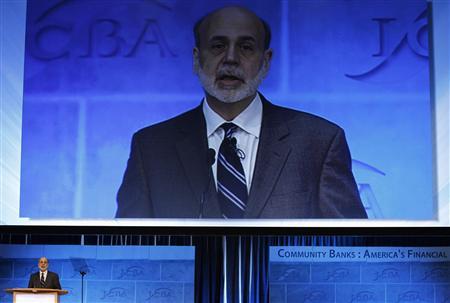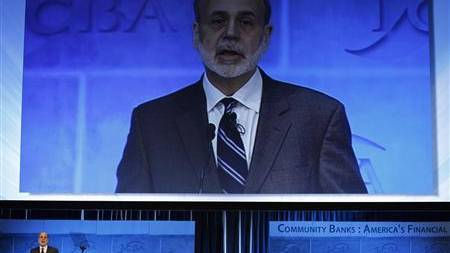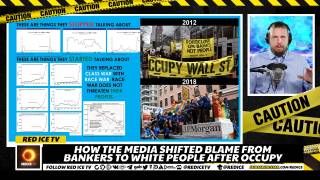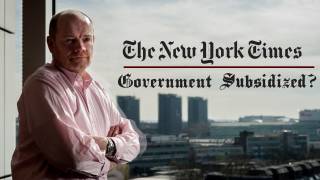Fed to hold media briefings in historic shift
Source: news.yahoo.com

Federal Reserve Chairman Ben Bernanke will break nearly 100 years of tradition at the U.S. central bank next month when he begins talking to the media after policy meetings.
The historic shift at an institution known for its secrecy will give Bernanke an opportunity to better inform the public and financial markets on how the Fed intends to maximize growth and keep inflation at bay. It also may help demystify the Fed at a time the central bank faces intense pressure to open up.
Bernanke, who has championed greater transparency since taking the reins at the Fed in 2006, will kick off on April 27 a program of four-times-a-year news conferences following a Fed meeting on monetary policy, the central bank said on Thursday.
It will be the first regularly scheduled briefing by a Fed chairman in the central bank’s history.
The announcement brings the 97-year-old U.S. central bank into line with its peers from the other Group of Seven rich countries.
With reams of market commentary devoted to parsing the Fed’s post-meeting statements, the central bank will now be able to convey a more-nuanced message on monetary policy than its brief statements can.
But it is not without risks.
With investors hanging on every word of the powerful Fed chairman, any misstep could roil financial markets.
"While it does give Bernanke an opportunity to clarify any market misinterpretation of the policy statement, it also opens the door to misinterpretation of what he says," said Kevin Flanagan, chief fixed-income strategist at Morgan Stanley Smith Barney. "He’s still going to be very careful."
FACING THE CRITICS
Congressional and public outcry for greater Fed disclosure has grown louder in the wake of the financial crisis, when the Fed bailed out failing financial firms and set up an array of programs to pump money into frozen credit markets. While some credit the Fed with saving the economy, many of its measures were met with stiff criticism.
An effort by lawmakers to expose the Fed’s policymaking deliberations to congressional audits won a surprisingly high level of bipartisan support last year. Some members of Congress have also sought to narrow the Fed’s mandate to focus solely on inflation rather than also aiming to keep unemployment low.
The Fed said Bernanke would hold a briefing after each policy meeting at which officials provide their quarterly economic forecasts, which fall in June and November this year.
"The introduction of regular press briefings is intended to further enhance the clarity and timeliness of the Federal Reserve’s monetary policy communication," the central bank said.
In a related move, the Fed said it would release its policy statement at 12:30 p.m. EDT (4:30 p.m. GMT) on those days, instead of the usual 2:15 p.m. EDT. The Fed’s policy panel meets a total of eight times a year.
OPENING THE DOOR
The Fed, which did not begin announcing its policy moves until 1994, has slowly been coming into the light.
Among other steps, it decided in 2004 to move up the publication of minutes of its meetings to three weeks from about six; in late 2007, it moved to issue economic forecasts quarterly, rather than twice a year; and in 2009, it began providing a long-run inflation forecast that is viewed as a de facto target.
Nevertheless, the Fed has fought to keep some of details of its operations secret. This week, it lost a court battle to withhold the names of banks that had taken emergency loans.
Faced with fierce criticism over the Fed’s crisis-fighting steps, Bernanke has stepped up efforts to explain the central bank’s actions to the public. He has given two extensive television interviews -- a rarity for a sitting Fed chief -- and taken reporters questions after two speeches.
It may take some time for financial markets to adapt to the Fed’s new communications plan.
Read the full article at: news.yahoo.com
Fed Chairman Ben Bernanke Will Hold Press Briefings Four Times A Year
Video from: YouTube.com
Bernanke at the ICBA Meeting
Video from: YouTube.com
Also tune into:
John Perkins - An Economic Hitman on Predatory Capitalism & Corporate Monopoly
Tracy Twyman - Alconomics, Money & Magic
Alan Watt - Money, Magic and Words
Ellen Brown - The Web of Debt & The Manufactured Financial Crash
Joseph P. Farrell - Babylon’s Banksters, Nazi International & Global Finanical Blackmail
Jim Marrs - Trillion-Dollar Bailout Conspiracy, American Revolutions & Wikileaks
Mary Croft - Natural Man vs. Artificial Person, Law, Money & Banking






















